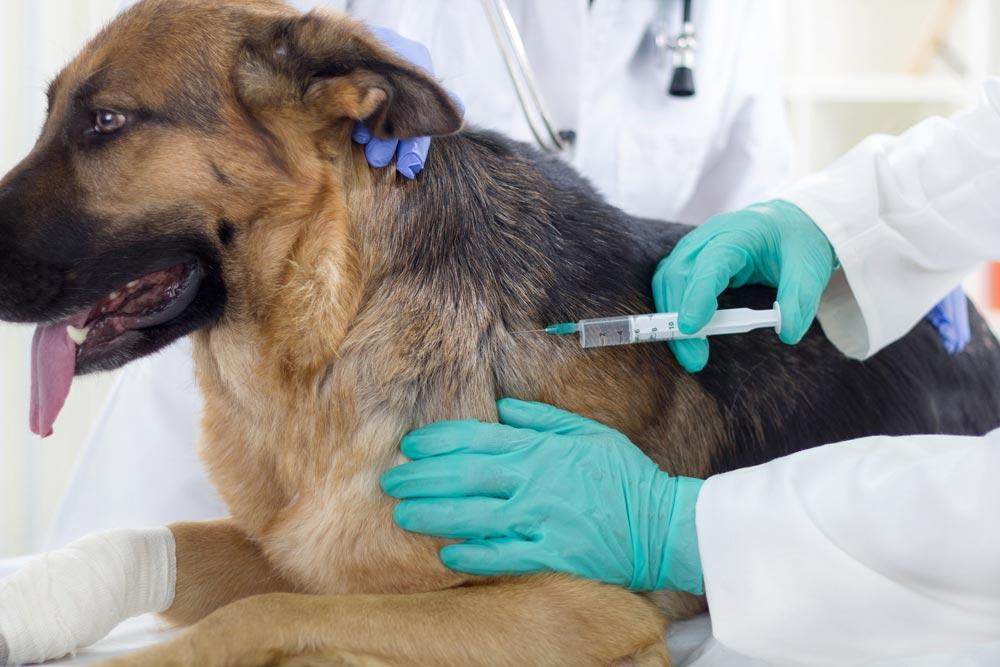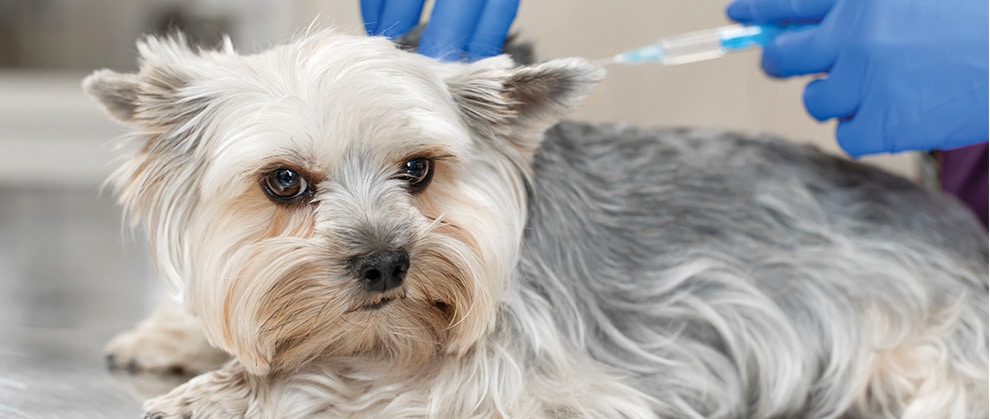Giving shots to pets, like dogs and cats, to keep them from getting contagious diseases is called “vaccination.” Vaccines contain disease-causing organisms or parts of them that have been weakened or killed. These substances drive the immune system of the pet to make an immunity reaction. This action from the immune system helps the pet make antibodies that protect it from certain diseases. Getting your pet vaccinated is an important way to stop the spread of illnesses that can infect both people and animals. It is possible for pet owners to protect their animals from dangerous and life-threatening diseases by giving them core and non-core shots on time and as directed. It is also important to vaccinate pets that stay healthy and happy in shelters, training facilities, and other shared spaces, since it lowers their risk of getting contagious diseases. Vaccinating pets also helps keep up group immunity, which is important for saving animals that are weak and lowering the general number of diseases that affect millions of animals.
Benefits of Pet Vaccination
Vaccinating your pet is an important part of caring for them that you shouldn’t skip. Our pets’ immune systems are protected and strengthened by it, and it also keeps people from getting illnesses. Vaccinations protect dogs from contagious diseases that can make them very sick or even kill them. Vaccinations can also lower the chance of diseases being passed from animals to people.
One disease that can be stopped by vaccinating your pet is Leptospirosis, which is caused by germs and can be passed from animals to people. We can protect ourselves and our families from this disease that could kill them by vaccinating our pets.
Getting our dogs vaccinated on a regular basis is important to keep them safe from getting common diseases. Vaccines protect against illnesses like rabies, distemper in dogs, feline leukemia, and lung infections in cats. These illnesses can be deadly, so having our pets healthy and happy is very important.
Not only does vaccination help individual dogs, it also improves the health of all pets in the neighborhood. Herd immunity, which helps keep millions of animals from getting sick, is created when a lot of pets are vaccinated.
Types of Pet Vaccinations
There are different kinds of vaccines for pets, and each one protects against a different sickness or illness. All cats need core vaccines to protect them against diseases that are easily spread and can be deadly. These diseases are common in the surroundings. Among other things, these core vaccines usually protect against rabies, canine distemper, feline distemper, and canine hepatitis. On the other hand, non-core shots are suggested based on how the pet lives and how likely it is to get some diseases. Cat leukemia, bordetella (kennel cough), and Lyme disease are some of the diseases that these shots can help protect against. People who own pets should talk to their vets to find out which shots their pets need based on things like their age, health, and where they live. When pet owners keep up with their pets’ vaccine schedules, they can give their furry friends the best defense against a wide range of contagious diseases.

Core and Non-Core Vaccines
Getting your pet vaccinated is a very important part of keeping them healthy. Vaccinating your pet not only keeps them safe from some contagious diseases, but it can also stop these diseases from spreading to people. It is important to know the difference between core and non-core vaccines in order to make a good vaccination plan.
Core shots are important for all dogs because they protect against serious diseases that can kill them. Core vaccines for cats, on the other hand, generally protect against rabies, feline distemper, calicivirus, and so on. These illnesses can be very bad for your pet’s health or even kill them.
These shots aren’t required for all dogs, but they might be suggested if the pet is likely to get some diseases. Dogs can get non-core shots to protect them from diseases like Lyme disease, kennel cough, and leptospirosis. Some non-core vaccines for cats are those for feline leukemia and viral peritonitis.
You are giving your pet important protection against serious diseases that can kill them by making sure they get their basic vaccines. Additionally, core vaccines help stop the spread of these diseases to humans, since some diseases can be passed from animals to people. You can customize non-core vaccines to your pet’s needs and risks, making sure they get the protection they need based on their habits and possible dangers.
Different Species Require Different Vaccines
Different species require different vaccines when it comes to pet vaccinations. Dogs specifically need hepatitis vaccines, which protect against canine hepatitis, a contagious viral infection that can cause liver damage. Cats, on the other hand, require vaccines for herpesvirus type 1 and panleukopenia, which is a severe and highly contagious feline viral disease.
The vaccination schedule is determined based on the breed and age of the pet. Puppies and kittens receive a series of vaccinations to build immunity against common diseases. As they grow older, these vaccines are given at specific intervals to maintain their protection. Some vaccines require boosters annually, while others may be necessary every three years.
It is essential to consult with a veterinarian to design a vaccination plan that suits your pet’s individual needs. Vaccinating against the appropriate diseases helps protect your pet’s health and prevents the transmission of diseases to other animals and humans. By staying up to date with your pet’s vaccines, you are ensuring their well-being and contributing to the overall health and safety of the pet community.
Diseases Prevented by Pet Vaccinations
Vaccinating your pet is crucial in preventing a wide range of potentially life-threatening diseases. These diseases can be caused by infectious organisms such as viruses, bacteria, and parasites, and can be easily transmitted from one pet to another. By vaccinating your pet, you can provide them with vital protection against diseases that have the potential to be debilitating or even fatal. Some of the common diseases that can be prevented through vaccinations include rabies, canine distemper, feline distemper, feline leukemia, kennel cough, and respiratory infections. Vaccines work by stimulating the immune system to build immunity against specific disease-causing organisms, so that if exposure occurs, the pet’s body can effectively fight off the infection. By keeping up with your pet’s vaccination schedule, you not only protect them from harm but also contribute to the overall health and well-being of the pet community as a whole.
Canine Distemper
Canine Distemper is a highly contagious viral disease that affects dogs of all ages and breeds. It is caused by the Canine Distemper Virus (CDV), which attacks the respiratory, gastrointestinal, and nervous systems of infected dogs.
The symptoms of Canine Distemper vary but commonly include fever, coughing, sneezing, discharge from the eyes and nose, vomiting, diarrhea, and neurological signs such as seizures and paralysis. The disease is transmitted through contact with bodily fluids from infected animals, including respiratory droplets and feces.
Vaccinating against Canine Distemper is vitally important to protect your pet from this serious disease. Vaccines stimulate the immune system to produce protective antibodies, which can prevent or reduce the severity of the infection. By vaccinating your dog, you not only protect them but also contribute to the overall health of the pet population.
Complications of Canine Distemper can be severe and may include pneumonia, encephalitis (inflammation of the brain), and even death. Surviving dogs may suffer long-term effects such as neurological disorders or have weakened immune systems, making them more susceptible to other infections.
Herd immunity plays a crucial role in controlling the spread of Canine Distemper. When a significant portion of the pet population is vaccinated, it creates a protective barrier that limits the transmission of the virus. This is especially important to protect vulnerable individuals, such as puppies and unvaccinated pets.
Feline Distemper/Feline Leukemia Virus (FeLV)
Feline distemper, also known as feline panleukopenia, is a highly contagious and often fatal disease in cats. It is caused by a virus that affects the blood cells and tissues, leading to severe gastrointestinal and neurological symptoms. Symptoms of feline distemper include fever, loss of appetite, vomiting, diarrhea, dehydration, and lethargy.
Feline leukemia virus (FeLV) is another viral infection that weakens the immune system and can lead to various health problems in infected cats. FeLV is easily transmitted from cat to cat through close and prolonged contact, such as mutual grooming or sharing food bowls. Infected cats may experience persistent infections, anemia, tumors, reproductive issues, and increased susceptibility to other infections.
Vaccinating against feline distemper and FeLV is crucial for the health and well-being of cats. Vaccines help stimulate the immune system to produce protective antibodies, which can prevent or mitigate the severity of the infections. By vaccinating your cat, you ensure its protection against these contagious and potentially fatal diseases.
Prevention is key when it comes to feline distemper and FeLV. These vaccines not only safeguard your cat’s health but also help curb the spread of these diseases within the feline population. Protecting your cat through vaccination reduces the risk of exposure to the virus and prevents transmission to other vulnerable feline companions. Vaccination is an essential part of responsible pet ownership, ensuring that your beloved feline friend has the best chance at a healthy and happy life.
Rabies Virus
Rabies virus is a highly significant concern in the realm of pet vaccinations due to its transmissible nature and the potential risks it poses to both pets and humans. This infectious viral disease affects the central nervous system and is almost always fatal once symptoms appear.
The symptoms of rabies in animals typically manifest in behavioral changes, including aggression, excessive drooling, and difficulty swallowing. As the disease progresses, pets may also experience paralysis and seizures. Rabid animals can transmit the virus through their saliva, primarily through bites or scratches.
Not only does rabies pose a severe threat to pets, but it also presents a considerable risk to humans. The virus can be transmitted to humans through contact with an infected animal’s saliva. Each year, millions of animals worldwide are affected by this deadly disease, with humans facing the risk of exposure to both domestic and wild animals.
Preventing rabies infection through pet vaccination is essential. Vaccinating your pet against rabies not only protects them from this life-threatening disease but also helps control its spread to humans. Local health departments and veterinary medicine stress the importance of up-to-date rabies vaccinations. By vaccinating pets and promoting responsible pet ownership, we can help prevent the further transmission of this real and severe disease.
In favor of vaccination efforts, it is crucial to highlight the significance of rabies vaccines as part of a comprehensive pet vaccination schedule. Together with other core and non-core vaccines, the appropriate use of rabies vaccines helps safeguard pets, promote their overall health and well-being, and contribute to the collective goal of achieving herd immunity against preventable diseases.
Kennel Cough (Canine Parainfluenza)
Kennel cough, also known as canine parainfluenza, is a highly contagious respiratory disease that affects dogs. It is caused by the bacterium Bordetella and is commonly transmitted when dogs are exposed to other canines in boarding facilities, grooming facilities, training classes, daycare, and dog parks.
The symptoms of kennel cough include a dry, hacking cough, sneezing, nasal discharge, and lethargy. In some cases, dogs may also experience a loss of appetite and a low-grade fever. While kennel cough is typically not life-threatening, it can lead to complications such as pneumonia, especially in younger or immunocompromised dogs.
Due to its highly contagious nature, kennel cough can spread rapidly among dogs in close quarters. The bacteria can be transmitted through coughing, sneezing, and direct contact with infected dogs or contaminated surfaces. This is why it is important to vaccinate your pet against kennel cough, especially if they will be spending time in boarding facilities or socializing with other dogs.
Vaccinating your dog against kennel cough not only protects them from this respiratory disease but also helps prevent the spread of the infection to other canines. By keeping your pet up-to-date on their vaccinations, you are not only safeguarding their health but also contributing to the overall well-being of the canine community.
Zoonotic Diseases
Zoonotic diseases are infections that can be transmitted from animals to humans. This makes pet vaccinations even more crucial, as they not only protect our furry friends but also safeguard the health of their human family members.
Rabies, a potentially fatal disease, is one such zoonotic disease. It is primarily transmitted through bites from infected animals, particularly dogs. By ensuring that your pet is vaccinated against rabies, you not only protect them from this deadly disease but also reduce the risk of transmission to humans.
Leptospirosis is another zoonotic disease that can affect both animals and humans. It is caused by bacteria found in the urine of infected animals, such as rats, dogs, and cattle. Dogs can contract leptospirosis by coming into contact with contaminated water or soil. Vaccinating your pet against leptospirosis can prevent them from acquiring the infection and potentially spreading it to humans through direct contact or contaminated environments.
By vaccinating your pet against zoonotic diseases like rabies and leptospirosis, you are taking a proactive step in protecting not only their health but also the well-being of your entire family. Vaccinations play a crucial role in preventing the transmission of these diseases and ensuring the safety and health of both animals and humans.
Bacterial Diseases
Bacterial diseases can pose a significant threat to the health of our beloved pets. Fortunately, through proper vaccination, we can protect them from these preventable illnesses and help prevent the spread of disease.
Vaccinating our pets against bacterial diseases is crucial because it not only safeguards their well-being but also reduces the risk of these illnesses being transmitted to other animals or even humans. Bacterial diseases can be highly contagious and can easily spread through direct contact or exposure to contaminated environments.
Several specific bacterial diseases can be prevented through pet vaccination. These include but are not limited to:
- Leptospirosis: This disease is caused by the Leptospira bacteria found in the urine of infected animals, such as rats and cattle. Dogs can contract it through contaminated water or soil.
- Bordetella bronchiseptica: Commonly known as kennel cough, this highly contagious respiratory infection affects dogs. It spreads easily in places with high animal density, such as boarding facilities and grooming salons.
- Lyme disease: Caused by the Borrelia burgdorferi bacteria, this tick-borne illness can affect both pets and humans. It can lead to joint pain, fever, and even kidney damage.
- Brucellosis: This bacterial infection primarily affects dogs and can be transmitted to other animals and humans. It can cause reproductive problems, including infertility.
Unvaccinated pets are at a greater risk of contracting these bacterial diseases. Additionally, they can serve as a reservoir for the bacteria, potentially spreading them to other animals and humans. By ensuring that our pets receive the necessary vaccinations, we not only protect their health but also contribute to the overall well-being of our communities. So, don’t skip their vaccinations – it’s a simple yet vital step toward keeping our furry friends safe and healthy.
Risk of Exposure to Unvaccinated Pets
Unvaccinated pets pose a significant risk of exposure to infectious diseases, not only for themselves but also for other animals and even humans. These diseases can easily spread through direct contact or exposure to contaminated environments. By failing to vaccinate our pets, we leave them vulnerable to these potentially life-threatening illnesses and also contribute to the spread of these diseases within our communities. Unvaccinated pets can serve as reservoirs for disease-causing organisms, potentially infecting other animals they come into contact with. This puts not only other pets at risk but also humans who may unknowingly come into contact with an infected animal. Vaccinating our pets is a simple yet essential step in protecting their health and preventing the transmission of infectious diseases.

Animals to Humans (Zoonosis)
Zoonosis, the transmission of diseases from animals to humans, highlights the critical importance of vaccinating your pets. Contagious diseases can easily cross species barriers, making it essential to protect both animals and humans from potential risks.
Zoonotic diseases can be transmitted through direct contact, such as bites or scratches, or indirectly through contaminated food, water, or surfaces. The potential risks involved include severe illnesses, hospitalization, and even death. By vaccinating your pets, you can prevent the spread of these diseases and protect your family.
Some common zoonotic diseases that can be prevented through pet vaccinations include rabies, which is transmitted through the bite of an infected animal, and leptospirosis, which can be contracted from contact with contaminated water. Other examples include ringworm, parasitic infections like toxoplasmosis, and bacterial diseases like salmonellosis.
To safeguard public health and maintain the well-being of your pet, it is crucial to keep up with their vaccination schedule. Vaccines not only protect your furry friends from deadly diseases but also reduce the risk of transmission to humans. By vaccinating your pets, you are taking an important step towards creating a healthier and safer environment for all.
Life-Threatening Diseases in Millions of Animals
Life-threatening diseases such as rabies, distemper, feline leukemia, parvovirus, and Bordetella pose serious risks to the health and well-being of our beloved pets. These diseases can cause severe illness and often lead to fatal outcomes. However, through timely pet vaccinations, we can prevent the spread of these diseases and protect millions of animals from unnecessary suffering.
Rabies, a viral disease transmitted through the bite of an infected animal, is one of the most well-known and deadly diseases. Distemper, affecting both dogs and cats, attacks the respiratory, gastrointestinal, and nervous systems and can have devastating consequences. The feline leukemia virus weakens the immune system, making cats vulnerable to various infections and cancer. Parvovirus is highly contagious and affects dogs, causing severe gastrointestinal symptoms that can be life-threatening. Bordetella, commonly known as kennel cough, is a respiratory disease that spreads rapidly, especially in crowded environments.
These diseases not only pose a significant threat to individual animals but also impact entire populations. The risk of exposure and transmission within animal communities, including shelters, boarding facilities, and breeding facilities, is high. Vaccination plays a crucial role in preventing the spread of these diseases, as it helps create herd immunity. By vaccinating our pets, we contribute to the overall health and well-being of not just our furry friends but also animals nationwide.
Conclusion
In conclusion, it is of utmost importance to prioritize pet vaccinations to protect our furry friends from life-threatening diseases. These diseases, such as rabies, distemper, feline leukemia, parvovirus, and Bordetella, can have devastating consequences and even lead to fatal outcomes. By getting our pets vaccinated, we not only safeguard their health but also contribute to the overall well-being of animal populations nationwide.









